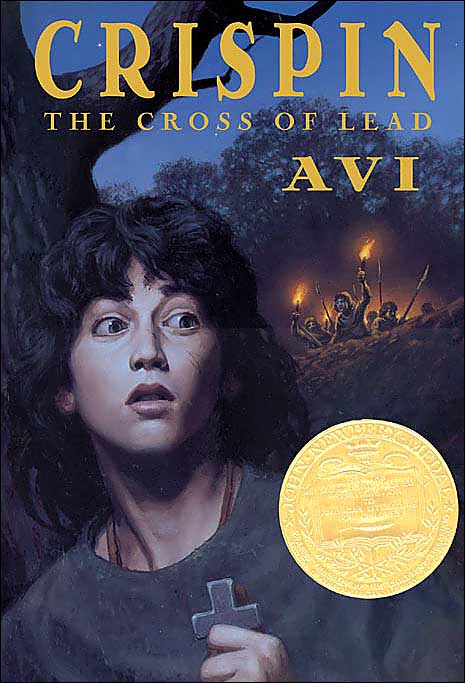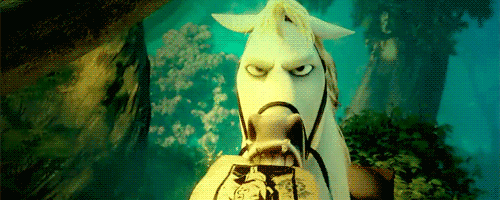Interestingly, mononymy declined in the West during the Middle Ages and has only recently become popular again with rockstars. Avi, the author of the medieval historical fiction novel, Crispin: The Cross of Lead, is bringing mononymy back for writers. He's written over fifty books in many genres, most of them for children. He has a great blog that answers readers' questions and talks about his writing process. Hence, Avi is the rockstar of the middle-grade fiction world. Is it even possible to be jealous of a writer like Avi? He's got about a 50-year head start on me. And his books have won the highest honors a children's book can get. I am beyond jealous...I am terrified to be confronted with the impossibility of his awesomeness.
I picked up a hardcover copy of Crispin a while ago at my local thrift store. It was in pristine condition with the gold Newberry medal shining brilliantly on the nearly flawless dust jacket. At that point, my natural inclination towards jealousy was completely overriden by sadness. An unread book of medieval middle-grade historical fiction is like a slap in the face to my own dreams. What if one of my books ends up in the local Goodwill one day, abandoned between crockpot cookbooks and last year's almanac? Do the children not want to read about the Middle Ages? Will they not want to read my book then either?
According to reader reviews of the book, that doesn't seem to be the case. Here's my favorite five-star review from Amazon reviewer Wyatt Singletary:
It's good and gets the readers attention quick but it also isn't good then it's really good and then its great
I agree, Wyatt Singletary. My work here is finished. Psych!
 The events of Crispin take place in England in 1377. It's told in the first person by a boy who goes by the name "Asta's son" because he doesn't know his real name. After his mother dies, he accidentally stumbles into a secret meeting with the local steward and a stranger. Suddenly, he is accused of theft and has to run for his life...literally. This is what is depicted on the book's cover. Run, Asta's son, run!
The events of Crispin take place in England in 1377. It's told in the first person by a boy who goes by the name "Asta's son" because he doesn't know his real name. After his mother dies, he accidentally stumbles into a secret meeting with the local steward and a stranger. Suddenly, he is accused of theft and has to run for his life...literally. This is what is depicted on the book's cover. Run, Asta's son, run!He tries to find asylum with the local priest, who tells him his real name is Crispin. The next morning, the priest's throat is slit, blood is everywhere, and Crispin has to run again. He ends up in the company of a huge jester-type man named Bear. Bear is a barely toned-down version of Falstaff, and he draws Crispin into some secret plots or something. To be honest, I couldn't really follow all of the intrigue that was going on, especially because the "twist" of Crispin's true identity wasn't too hard to figure out so all of the extra machinations felt superfluous to me. Unlike the last book I reviewed, Rose, it was clear this book was going to be scary and violent throughout, with lots of period-appropriate villians and weapons.
All in all, the book is action-packed and entertaining. It's got the 3 P's of medieval historical fiction: poverty, pestilence, and patriarchy. I just made those up, but I'll stand by it. It's not an inaccurate picture of fourteenth-century England, but Crispin is definitely a book that appeals to boys. There are knife fights, dirt, blood, and few women in sight. If you want some medieval girl stories, you have to go to Karen Cushman because she has the market cornered on that.
What I was really interested in about Avi's book was how he constructed and explained his medieval setting. I struggled with that in my own writing, so I was curious to learn from the master. Avi's approach was to just dive right in. He doesn't shy away from tough medieval concepts like crop rotation, land-owning nobility, wolfesheved, Catholicism, and of course, death. Some of them are casual asides, while some are explained fairly well. But all of them are woven in seamlessly and with little commentary. He uses difficult, period-specific vocabulary with no explanation--something I was worried about doing--and it works. Writing lesson: readers will keep up even if they don't know every word.
It was great to hear reviewers liberally praise the book's setting:
Avi has done an excellent job of integrating background and historical information, of pacing the plot so that the book is a page-turner from beginning to end, and of creating characters for whom readers will have great empathy. -- School Library Journal
Avi builds an impressive backdrop for his arresting characters: a tense medieval world in which hostility against the landowners and their cruelties is increasing. There's also other nail-biting tension in the story that builds to a gripping, somewhat confusing ending, which finds Crispin, once weak, now strong. Readers may not understand every nuance of the political machinations that propel the story, but they will feel the shifting winds of change beginning to blow through a feudal society. -- Booklist
The Middle Ages was such an interesting, complex time when children had real responsibility to provide for their families and communities that it blows my mind that it isn't a popular setting for children's historical fiction. Far from being jealous of Crispin, I was inspired by it. Yes, it's a depressing story. Yes, women aren't in it. Yes, it's slightly convoluted. But it brought a far-away time and place to life, and did it in an exciting way. And kids think it's cool! Reading Crispin made me realize I have a lot to work on in my own novel. I need to raise the stakes for my characters and trust my readers more. Writing lesson: high stakes are important in any time period.
Rock on, Avi. Rock on. I will rescue your books from the thrift store any day.
In Summation
Did I like it? Most of it, yesWould I recommend it? Absolutely
Did it make me jealous? Not at all










